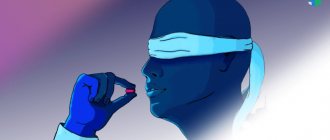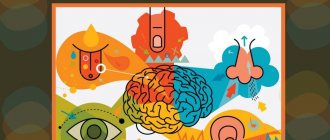Placebo effect
- this is an improvement in the patient’s condition after taking a drug - a “dummy” (that is, does not contain any active medicine), which the patient believes in as a strong and effective remedy.
Psychologists associate the mechanism of action of the placebo effect with attitude.
An attitude is an unconscious state, like a reflex, a predetermined readiness for action. From a physiological point of view, a placebo is caused by the presence of a focus of overexcitation in the brain, which determines the body’s response in a certain direction through the peripheral nervous system, vascular and endocrine systems.
Placebos are widely used in testing new drugs and evaluating their effectiveness.
One group of subjects takes a real drug, the other group takes a dummy placebo, outwardly indistinguishable from the real drug. The subjects themselves do not know who has the placebo and who has the real medicine. The study organizers conduct an analysis to evaluate the effect of the drug being tested.
An entire area of medicine is built on the placebo effect. This is homeopathy - a type of alternative medicine, which is based on the use of “special” drugs obtained as a result of large dilution.
Official academic medicine has always disowned homeopathy, considering it at least a “dummy” and at most misleading the patient. But among doctors there have always been a few “innovators” who used homeopathy in their practice. Moreover, some of them agree that homeopathy is just a placebo, and it should be used for good purposes.
An interesting fact is that some doctors who call themselves homeopaths refuse to believe that homeopathy is a placebo. They are convinced and convince everyone around them that homeopathic medicines have a real active substance (in especially small concentrations that cannot be detected by equipment), which has a healing effect.
So, these doctors’ results from using homeopathy are significantly better than those of “skeptics who are confident in the placebo effect.” It turns out that the placebo effect can enhance itself!
All drugs have a placebo effect. Just like talking to a doctor. Even taking tests and conducting an examination has its placebo effect. Scientists have even calculated the severity of the placebo effect, which, on average, can reach 30% of the total therapeutic effect of the drug.
Naked Faith: 10 Surprising Facts About the Placebo Effect
The placebo effect usually raises eyebrows even among the most stubborn skeptics. We can't predict the future or move physical objects with our minds, but the placebo effect is almost as amazing a phenomenon (Ben Goldacre once called it "the coolest, weirdest thing in medicine").
The “placebo effect” describes how our simple beliefs about the effectiveness of a proposed treatment or intervention can lead to apparent health benefits and cognitive changes. This is an irrefutable demonstration of the almost magical power of mind over matter. And of course, it's not magic. Our beliefs are the subjective echo of physical processes in the brain, and it is this constellation of neurochemical and electrical events and their subsequent effects that underlie the placebo phenomenon (in some cases, the placebo effect is interpreted as a form of conditioned response in which a learned physiological response occurs in the absence of an original trigger ).
There is another approach to this issue. For psychological researchers, the placebo effect is not only a surprising phenomenon, but also a methodological nuisance. Researchers make every effort to rule out the effects of expectations and determine which observed effects are actually due to the intervention.
We present 10 surprising discoveries related to placebos.
The placebo effect works even when you know it's a placebo
It is believed that for the placebo effect to occur, deception is required - the patient is made to think that the dummy drug is actually a strong medicine or something like that. It is because of this need for deception that deliberate placebo exposure in medicine is considered unethical. However, nearly a decade ago, researchers showed that people with irritable bowel syndrome felt much better after they were given a so-called “open-label placebo” that they were told was a complete dud, as if they had taken nothing. .
Presumably, if people are told that a treatment is ineffective, they still have some hope and expectation of an effect (or there is a conditioned placebo response that does not require positive beliefs). More recent studies have shown open-label placebo benefits for many other conditions, including back pain and seasonal allergies. According to some experts, open-label placebos "remove at least some commonly accepted ethical barriers" to the clinical use of placebos. Others, however, have highlighted the lack of sufficiently robust research in this area, and it is worth noting that there were some null results - for example, open-label placebos failed to speed up wound healing.
Branding, colors and medical attributes can enhance the placebo effect
Open-label placebos aside, there is evidence that different forms of placebos vary in their effectiveness. The more powerful we imagine their influence, the greater the benefit. This means that four placebo pills have a greater effect than two, and injections filled with saline alone are more effective than pills (in the case of osteoarthritis, a placebo injection was found to be more effective than the real medicine). Also, depending on the condition being treated, certain colors and descriptions of tablets are more effective than others. For example, blue placebos are more sedative than pink placebos, and branded placebo pills are more effective than unlabeled medications.
The influence of the reliability of a particular placebo on its subsequent effectiveness may explain one of the most surprising demonstrations of the placebo effect that I have encountered. This is “placebo brain surgery.” Specifically, the study found that Parkinson's disease patients who underwent placebo brain surgery (presumed, not actually, including a stem cell injection) experienced greater improvement in symptoms than those patients who received treatment stem cells without knowing it. “The placebo effect was very strong in this study,” the researchers said, “demonstrating the value of placebo-controlled surgical trials.”
Some people are more susceptible to the placebo effect than others
The likelihood that a person will experience the placebo effect is related to certain personality traits. This makes sense, since the placebo effect depends on our beliefs and expectations, which some people are more willing and enthusiastic about than others. Optimists are more sensitive to placebo painkillers, as are people who score higher on emotional stability and friendliness. Interestingly, the traits associated with the placebo response vary depending on the condition being treated—for example, the study found that under stress, participants who were more pessimistic and less empathetic had a greater placebo effect. But there is no reliable evidence that gender and age are associated with the placebo effect.
Some doctors are better at inducing the placebo effect than others.
Because the placebo effect depends on whether the patient believes in the power of the treatment they are receiving, some doctors may be better able to instill this hope and expectation than others. A study that involved a placebo injection to treat an allergic reaction found that the improvement in symptoms was greater when the injection was given by a doctor who exuded warmth and confidence. Feeling similar to a doctor may also make a difference: Another study found that pain after a medical procedure was felt less when participants thought they were being treated by a doctor who shared the same values and beliefs.
The placebo effect isn't just about reducing pain, it can also boost creativity and cognitive performance.
We usually think of the placebo effect in the context of treatment and especially pain relief. However, there is growing evidence that this effect extends to other areas, such as improving physical and mental performance. Various studies have shown the effects of placebos on speed, strength and endurance (in one, researchers asked cyclists to train to the point of exhaustion and found that they could last significantly longer when their watches were secretly adjusted to make them run slower).
When it comes to creativity, one study found that people exposed to a scent that they were told increased creativity scored higher on creativity tests compared to a control group that smelled the same scent but was not told about it. its supposedly positive effect. In another experiment, participants received a placebo brain stimulation and completed a learning task. The placebo group believed their brains were being stimulated by a mild electrical current—which was not the case—and they were convinced that the stimulation enhanced their cognitive function. Subsequently, these participants demonstrated greater accuracy on the learning task and faster reaction times than the control group. “We conclude that experimentally induced anticipation may affect cognitive performance in healthy adult participants,” the researchers said.
There is even such a thing as placebo sleep
The manifestations of the placebo phenomenon are almost endless. In one new study, the authors made participants believe they slept longer than they actually did, and then observed how this affected their performance the next day. The researchers pretended to hook up participants to various measuring devices and then told some of them how long their REM sleep lasted. After hearing that they had an impressive amount of sleep, participants performed better on tests of language and arithmetic. In another study, hotel cleaners were told that their work could be considered physical exercise and their health scores improved, including weight, body mass index, waist-to-hip ratio and blood pressure. Another interesting research finding that could be explained by a sort of placebo effect was that people who believe they exercise more than their peers tend to live longer, regardless of how much they actually exercise.
Animals experience the placebo effect too
Animal drug trials often compare an active treatment with a placebo, similar to the procedure for human trials. And researchers often observe that a significant number of animals in the placebo group respond to treatment, for example in an antiepileptic drug trial in dogs, and when adjusting diet for muscle strength in horses. The problem with interpreting these types of results is that the placebo effect may actually affect owners who interact with their animals differently when they believe they are receiving medical care or nutritional supplements.
However, the argument that animals can exhibit some sort of placebo effect is compelling in the context of laboratory studies involving rodents. In it, researchers combined an active drug, such as morphine, with a specific taste or smell, and then showed that the pain-relieving effect occurred when the test subject experienced the same taste or smell but did not receive the drug. In this case, the placebo effect arises from a conditioned response rather than from the animals' expectations, but it is probably also part of the placebo phenomenon in humans. As Edward Ernst said, “The bulk of what we think is the placebo effect has been found in animals.”
The placebo effect has a harmful counterpart
If the placebo effect occurs simply because you believe that a given treatment will be beneficial, then negative expectations may lead to worsening symptoms. This is exactly what the researchers discovered, and they called it the “nocebo effect.” This placebo analogue should not be neglected. A meta-analysis of pain management studies (where some participants are told that a cream or pill causes more pain in some people) found that the nocebo effect is roughly the same size as the positive placebo effects.
Interestingly, nocebo effects can occur even in the presence of real painkillers, not just dummies—in one study, participants were told that their pain would get worse when they stopped taking the analgesics. The physiological analgesic effect was maintained, but these participants no longer felt it, as if negative expectations negated the true analgesic effect. The real-world implications of these types of findings are clear—it's probably worth being more careful when reading about the side effects of your latest prescription.
The placebo effect is a problem for many psychology researchers
The placebo effect itself is amazing, but it can drive researchers crazy when trying to determine the effectiveness of psychological interventions. The influence of expectations on our thoughts, feelings, and behavior is so powerful and pervasive that it makes many studies difficult to interpret unless they are very carefully designed. In a 2013 paper titled "The Common Problem with Placebos in Psychology," a team led by Walter Booth of the University of Florida argued that, in fact, many psychological studies (on topics such as brain training, expressive writing, and Internet therapy) do not sufficiently take into account participants' expectations in different conditions.
They explain that a simple active control condition is not enough unless participants in the control group expect it to have the same beneficial or powerful effect as participants taking a placebo. The way to get around this, Booth and colleagues explain, is to measure participants' expectations and take steps to bring them as close as possible to the control and intervention conditions. “We hope that future studies of the placebo effect will be better designed and provide stronger evidence of the effectiveness of interventions,” they concluded.
The placebo effect is enhanced
Interestingly, in recent years it has become apparent that the placebo effect is increasing; this has been the case with antipsychotic drugs, antidepressants, and—exclusively in the United States—analgesics. Research team leader Geoffrey Mogil told Nature News: "We were absolutely amazed when we realized this." Specifically, in the 1990s, participants receiving the active drug reported a 27% greater reduction in pain than participants receiving a placebo, but by 2013 the difference was only 9%. One explanation is that drug trials have become larger and more complex, especially in the US, increasing the drama and intensity of the experience for participants receiving only placebos.
Another explanation is that the general public has become more aware of the placebo effect—and the idea that its effect on symptoms may be real (less pain-related brain activity, for example) rather than just illusory. This argument was made by anesthesiologist Gary Bennett in Pain magazine last year. In fact, Bennett goes so far as to suggest that because the term placebo currently produces such a strong placebo effect, its use should be eliminated from drug trials. “The word 'placebo' should be avoided in all information and instructions given to patients,” he advises. “Instructions to the patient should be aimed at establishing expectations in the form: “Pain relief is possible” and “Pain relief is not possible.”
No matter how hard we try to control, hide, and understand the placebo effect, it seems that it will continue to baffle and surprise us for a long time to come.
Source
Interesting article? Subscribe to our Telegram channel to receive more educational content and fresh ideas.
Tricks of invention
The placebo effect has a long and rich history. It played a big role in the medicine of past centuries, when patients had to be treated with herbs and useless drugs.
The first scientific demonstration of the placebo effect occurred in 1799, when the British physician John Haygarth decided to test one of the “healing” drugs that were sold in shops at the time: expensive metal rods called “Perkins tractors” that supposedly drew diseases out of the body and helped to cope. with rheumatism thanks to a special alloy. Haygarth replaced the “healing” metal rods with wooden ones and, under the guise of “Perkins tractors,” offered them to subjects. Four out of five patients with rheumatic fever reported that their pain had improved.
We are happy to be deceived
Caricature of Elisha Perkins trying to cure a patient with his metal "tractors", 1754
Photo: Getty Images/Photo 12
The term itself first appeared in 1920 in an article in The Lancet. The placebo effect came into clinical practice after American anesthesiologist Henry C. Beecher noticed during World War II that some wounded people mistook regular saline as a painkiller.
Farm factor: the EAEU may have its own medical agency
A single regulator, an analogue of the European EMA, will speed up the registration of drugs in the member countries of the union
At Dr. Beecher's insistence, placebos became the basis for double-blind drug trials, in which one group of people was given the real drug and the other a sham drug. A drug was considered effective only if it was statistically superior to placebo.
Does this effect occur in animals?
Interestingly, scientists admit the following: the placebo effect can occur even in animals. Scientists conducted the following experiment: dogs with epilepsy were divided into two groups and given medication. The first group - anticonvulsants, the second - pacifiers. Three similar experiments concluded that among dogs given a placebo, the number of seizures decreased by 79%.
Scientists believe that several factors explain this action. In particular, animals may be influenced by the expectations of their owners, who convey to them confidence in the effectiveness of the treatment by giving the drug. The expectation of an animal that, suffering from epilepsy, has been receiving various medications for many years and already reflexively expects that after the medication it will feel better, also works. However, scientists do not deny that such results may be associated with the cyclical nature of the disease, because the study involved animals at the peak of the disease, which later could simply fade away a little.
Nocebo - placebo's evil brother
There is the antithesis of the placebo effect. This is when a person taking a drug that has no pharmacological properties begins to feel worse. The nocebo effect is currently less well studied because its research involves purposefully worsening the condition of patients, and this is unethical. At the same time, scientists have still identified a number of factors that determine the strength of the influence of this strange phenomenon:
- Negative forecasts. When the doctor starts talking about potential problems and results;
- Confidence. When your level of faith in the treatment or doctor is insufficient and you doubt the competence of the specialist;
- Previous experience. When similar treatment has failed;
- Price. Recent studies have shown that the perception of nocebo can be influenced by the announced price of the drug. For example, you might be told that a magic pill (dummy) will be expensive and you can expect side effects, including nausea and dizziness.
As a result, each case increases the chance of a nocebo effect, where patients begin to feel worse from taking ineffective drugs. The power of suggestion is a double-edged sword.
Does prayer heal?
Probably every person has heard about how certain objects related to religion or special prayers healed people from dangerous diseases. Many researchers have studied exactly how prayer affects a person. There are different explanations - from altered consciousness to bioresonance created during the reading of a prayer. However, the most likely explanation is an unshakable belief in the power of prayer, which is essentially the same placebo effect.
After all, the main essence of this effect is a strong belief in success, and it doesn’t matter whether it’s due to the use of pills or the reading of prayers.
However, one must also take into account the fact that noncebo also exists in the aspect of religion. As an example, we can recall the “voodoo curse” - if in Africa a shaman, whose authority in the tribe is incredibly high, curses someone, then this leads to the death of the cursed person. The whole point is that a frightened person believes in impending death so much that it becomes almost inevitable.
General information
As you know, modern medicine is usually divided into traditional and alternative .
And if traditional methods of treatment are used by certified doctors practicing in medicine. institutions, then the category of alternative medicine includes those who “do not fit” into the traditional framework: homeopaths, psychics, as well as healers who practice treatment with biocurrents, holy water, influence at a distance, and other methods that are often perceived with skepticism. However, many people still try to recover from serious illnesses using such methods. However, alternative medicine is not always an example of quackery. For example, modern medical centers now widely use acupuncture , which initially, having arrived in European countries from China, was considered an untested and very strange method.
However, the most interesting thing is that even the most incomprehensible and completely unscientific treatment methods sometimes help people get rid of serious diseases. In particular, there are many cases where people were cured under the influence of psychics “from TV”, miracle pills or “charged” water. In this case we are talking about an effect recognized by traditional medicine. This is placebo effect , about which many scientific studies have been written. Its mechanism is related to the healing potential “within the person.” More details about the essence of the placebo effect and how it works will be discussed below.
conclusions
A placebo is often either an injection or a dummy that appears to be a cure but is not. However, the effects of placebos are scientifically documented, but they ONLY work when relieving symptoms. Infections, heart disease, rheumatism and other serious ailments require specialized treatment with the prescription of appropriate medications. Solving problems of this nature with the help of placebos is dangerous and stupid. Conviction and your faith in the treatment play a big role in the influence of placebo. Therefore, trust competent specialists, don’t be smart and be healthy!











